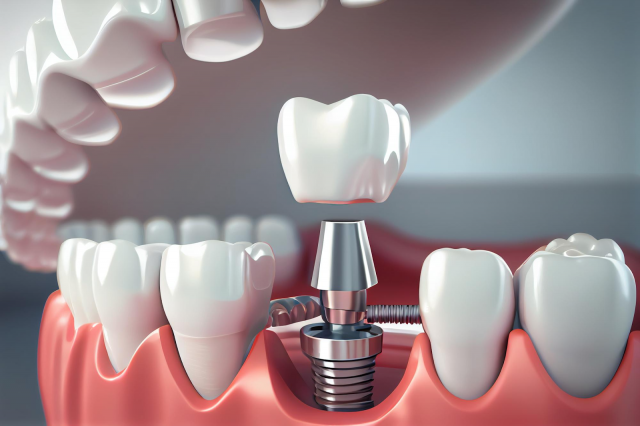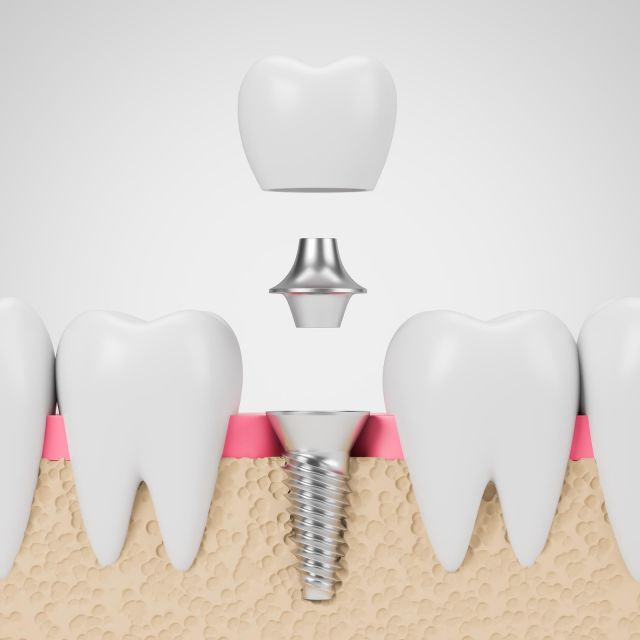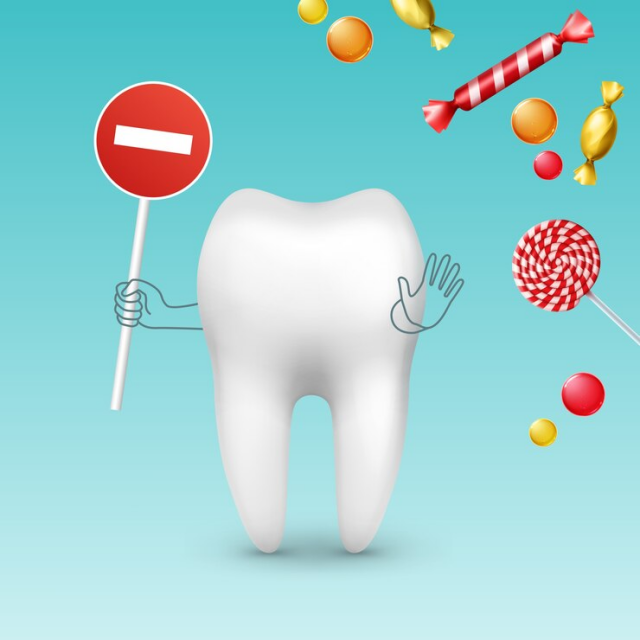What is a Dental Crown?
First off, let us define what a dental crown is. A dental crown is a customised tooth-shaped cap to cover a patient’s tooth. This procedure serves to cover a tooth that has been damaged or decayed. They can also be used to improve the appearance of a tooth that is discoloured, chipped or misshapen.
The Different Types of Crowns
Temporary crowns and permanent crowns are both used in dental procedures, but they serve different purposes and have distinct characteristics:
Temporary Crowns vs Permanent Crowns
Temporary Crowns:
- These are usually made in the dental office by the dentist.
- They are used to protect a prepared tooth while the permanent crown is being fabricated in a dental laboratory.
- Temporary crowns are typically made from acrylic or composite materials, which are not as durable as the materials used for permanent crowns.
- They are meant to be a temporary solution and are not as aesthetically pleasing or as strong as permanent crowns.
- Temporary crowns are cemented with temporary cement, allowing for easier removal when the permanent crown is ready.
Permanent Crowns:
- Permanent crowns are custom-made in a dental laboratory using materials such as porcelain, ceramic, metal (such as gold alloy), or a combination of these materials.
- They are designed to closely match the shape, size, and colour of the natural teeth for a more aesthetically pleasing result.
- Permanent crowns offer greater durability and longevity compared to temporary crowns. They can withstand the forces of chewing and biting for many years with proper care.
- Permanent crowns are typically cemented onto the prepared tooth using dental cement, creating a strong and permanent bond.
(Source: Freepik.com)
Different Dental Crown Materials: What are Dental Crowns Made of?
There are several types of dental crowns, each with its advantages and considerations. Here are some common types:
Porcelain Fused to Metal Crowns: These crowns have a metal base covered with a layer of tooth-coloured porcelain. They provide durability due to the metal base and aesthetic appeal due to the porcelain covering.
All Ceramic or all Porcelain crowns: These crowns are entirely made of ceramic material, providing excellent aesthetics as they closely mimic the natural appearance of teeth. They are often preferred for front teeth due to their lifelike appearance.
Metal crowns: These crowns are made entirely of metal, such as gold or base metal alloys. They are highly durable and resistant to wear, making them suitable for molars. However, their metallic appearance makes them less desirable for visible teeth.
Zirconia crowns: Zirconia is a strong, tooth-coloured material that can be used to make crowns. Zirconia crowns offer excellent strength and aesthetics, making them a popular choice for both front and back teeth.
Porcelain-fused-to-zirconia (PFZ) crowns: These crowns combine the strength of zirconia with the aesthetics of porcelain. They provide durability and natural-looking results, making them suitable for various dental restorations.
Composite crowns: These crowns are made of a tooth-coloured composite resin material. They are typically used as temporary crowns or for specific aesthetic improvements.
Temporary crowns: These crowns are usually made of acrylic or stainless steel and are used as a temporary restoration while a permanent crown is being fabricated in a dental laboratory.
Each type of crown has its advantages and considerations, and the choice depends on factors such as the location of the tooth, aesthetic preferences, budget, and the dentist’s recommendation based on the patient’s specific needs.
(Source: Freepik.com)
Who needs a dental crown?
Reason 1: Broken or Fractured Teeth
If a tooth is cracked, fractured, or extensively decayed, a dental crown can restore its strength and function.
Reason 2: When a patient needs a root canal
A root canal is often recommended when a tooth becomes irreparably decayed or infected. After the root canal is completed, a crown will be used to strengthen the weakened tooth.
Reason 3: Dental Implants
Once the dental implant is placed into the jawbone, the crown covers the top of the implant, allowing the patient to chew normally. The crown is part of a permanent restoration.
Reason 4: Large Fillings
Teeth with large fillings may require a crown to provide additional support and prevent further damage.
Reason 5: Cosmetic Enhancement
Crowns can be used for cosmetic purposes to improve the appearance of misshapen, discoloured, or poorly sized teeth.
What are the benefits of dental crowns?
The most notable advantage of a dental crown is:
- Treat worn, broken or decayed teeth.
- Protect teeth from erosion (wear and tear).
- Strengthen weakened or damaged teeth.
- Improve teeth appearance.
- Long-lasting solution for dental restoration.
What are the side effects of dental crowns?
There may be some additional side effects once the final crown is placed such as:
- Sensitive to hot and cold
- Gum irritation at the gumline
- Gum recession at the crown
- Continued soreness
Recovery and Outlook
How long does it take to feel better after a dental crown procedure?
The time it takes to feel better after a dental crown procedure can vary depending on several factors. This includes the individual’s pain tolerance, the extent of the procedure, and how well they follow post-operative care instructions. Most people can resume their routine activities immediately following crown placement.
In general, some discomfort and sensitivity are common immediately after the procedure, but this typically subsides within a few days to a week. However, it may take a few weeks for the area to fully heal and for any initial discomfort to completely disappear. It is important to follow any post-operative instructions provided by your dentist and to contact them if you experience severe or prolonged pain.
(Source: Freepik.com)
Foods to avoid with a crown
Whether you have a temporary or permanent crown, there are foods you should avoid, including:
- Acidic beverages: Carbonated drinks can sometimes cause discomfort or sensitivity around dental work. Additionally, they can contribute to enamel erosion, which may affect the longevity of the crown.
- Hard foods: Refrain from biting down on hard foods like ice, nuts, hard candies, or popcorn kernels, as they can crack or break the crown.
- Tough meats: Be cautious when eating tough meats, especially if they require excessive chewing. Cut them into smaller, more manageable pieces to avoid putting too much pressure on the crown.
- Sticky or chewy foods: Avoid sticky candies, chewing gum, or other sticky snacks as they can pull on the crown and potentially dislodge it.
How long do crowns last?
On average, dental crowns can last anywhere from 5 to 15 years or even longer with proper care. The lifespan can vary depending on several factors, including the material used, the quality of the crown, oral hygiene practices, and habits such as teeth grinding or clenching. Regular dental check-ups can help monitor the condition of crowns and determine if they need repair or replacement.
How To Take Care of Your Dental Crowns?
- Brush your teeth using fluoride toothpaste and a soft-bristled toothbrush at least twice a day.
- Floss daily.
- Avoid sticky and hard food.
- Use an antibacterial mouthwash.
- Visit your dentist regularly for cleaning.
Are dental crowns painful?
The placement of dental crowns itself should not be painful because the procedure is typically done under local anaesthesia, which numbs the tooth and surrounding tissues. However, it is not uncommon for patients to experience some discomfort or sensitivity after the procedure, particularly in the days immediately following the placement of the crown.
Dental cap vs. crown: Is there a difference?
“Dental cap” and “dental crown” are two terms used interchangeably to refer to the same dental restoration. Both terms describe a covering that is placed over a damaged or decayed tooth to restore its shape, size, strength, and appearance.
So, in short, there is no difference between a dental cap and a dental crown. They both refer to the same dental procedure and restoration. The term “dental crown” is more commonly used in professional dental terminology, while “dental cap” is often used by patients as a more colloquial term.
Conclusion
In conclusion, dental tooth crowns are an invaluable dental treatment option for restoring and enhancing the function and appearance of damaged teeth. By understanding their purpose, types, procedures, and aftercare tips, you can make informed decisions about your dental health and enjoy the benefits of a healthy, beautiful smile for years to come.
For expert dental care and personalised treatment options, feel free to contact us!









